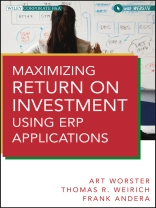Step-by-step guidance to achieving maximum return on investmentfor your company
Written by Arthur Worster, Thomas Weirich, and Frank Andera, industry experts at the forefront of the business processes arena, Maximizing Return on Investment Using ERP Applicationsprovides accountants, IT executives, and finance professionals witha new way of looking at enterprise resource planning (ERP)-drivenbusiness improvement programs. This timely book explores howleadership can view its organization as an integrated enterpriseand what this change in perception might suggest. It considersvarious aspects of running a business and how a different approachmay present new insight.
* Incorporates all aspects of gaining ‘Return on Investment’ from ERP investments
* Considers change management from all angles, including workingwith the executive levels on defining return on investment cases, working through political and cultural issues at the executiveleadership level
* Includes a companion website featuring exercises, referencematerials, and case studies
With the rapid implementation of ERP systems worldwide, businessexecutives often have difficulty in determining the return oninvestment from such systems. Along with a companion websitefeaturing exercises, reference materials, and case studies, Maximizing Return on Investment Using ERP Applicationsoffers straightforward and hands-on guidance to lead yourorganization through the change process and ensure that theintended benefits can be achieved.
表中的内容
Preface xiii
Acknowledgments xxvii
Introduction 1
Action 5
Thinking 6
Context 6
PART I A LEADERSHIP PERSPECTIVE 9
Chapter 1: The Law of Unintended Consequences 11
Introduction 11
What Is the Law of Unintended Consequences? 12
Management Systems 14
The Challenge 23
Summary 24
Notes 25
Chapter 2: Leadership and Change in an Integrated Business World 27
Introduction 28
The Universe Outside, the Universe Within 28
The Journey 29
The Evolution of Integrated Programs for Continuous Improvement31
A Deeper Look into Integration 32
MRP II Comes to the Mainstream 32
The Move to IT-Related Applications Solutions 34
Leaders and the Leadership Gap 35
Summary 41
Notes 42
Chapter 3: A Historical Business Perspective of ERP43
Introduction 43
Legacy Systems (19601970/1990) 45
It’s All about the Back Office: Getting a Single Versionof the Truth (19701990) 46
Improving the Business (19902000) 47
The Business Suite: Enriching the Functionality (19962005)50
Getting Information and Analysis out of the Data Ocean(19972007) 51
Corporate Reporting and Dashboards (2007Today) 52
The Era of Governance: Implications for the Future 53
Summary 54
Notes 59
PART II CONTEXTUAL ANALYSIS 57
Chapter 4: Return on Investment–Developing the Business Case 59
Introduction 60
Example 1: Cost Reduction 61
Example 2: Greater Manufacturing Capacity Leading to Increased Sales 63
Providing Business Value to an Enterprise 64
Summary 74
Note 75
Chapter 5: Business Process Analysis 77
Introduction 77
Where Are We Headed? 78
Business Process Design 80
Process Understanding Reveals Complexity 82
Business Process Management 83
Skills to Include 84
A Plan for Action 89
Summary 90
Notes 90
Chapter 6: Business Culture, Politics, and Organization91
Introduction 91
Cultural Barriers and Enablers 92
Keys to Understanding Culture, Politics, and Organization 94
Compiling Insights Gained 102
Relating These Insights to the Project Itself 103
Summary 105
Notes 105
Chapter 7: IT Strategy Review 107
Introduction 107
An Example of a Flawed IT Strategy 108
What the Introduction of ERP Meant 110
A Better Way 111
Empowering the Future by Optimizing the Past 117
Summary 118
Note 119
Chapter 8: Workforce Education and Readiness 121
Introduction 121
The Workforce as a Learning Organization 122
Workforce Education 125
Business Education in an Integrated Business World 130
Summary 133
PART III A NEW PROGRAM GOVERNANCE APPROACH 135
Chapter 9: Integration of Organizational Needs 137
Introduction 138
Approach to the Analysis Process 140
Consolidation 146
Summary 148
Chapter 10: Developing a Governance Process 149
Introduction 150
Leadership Challenges 150
Program Governance Process 151
Continuous Improvement Programs 160
Summary 163
Chapter 11: Organizational Change Management 165
Introduction 165
Expanding the Role of OCM 166
Organizational Change Management with Leaders 168
The Trusted Adviser 169
Change Management Process 170
Summary 177
Chapter 12: Conclusions and Opportunities 179
The Journey 179
The Next Step 181
Leadership 183
The Path Forward 184
The Law of Unintended Consequences 186
How Insights Relates to Manufacturing 191
The Story Is Economic 191
Summary 192
Notes 193
Postscript 195
About the Authors 201
About the Website 207
Index 209
关于作者
ARTHUR J. WORSTER is President of Worster Associates, LLC. As a business executive and later a global consulting leader, he developed and utilized methodologies to implement IT-supportedchange in Fortune 500 companies. He has also served as programconsultant to a number of companies and executives.
THOMAS R. WEIRICH, Ph D, CPA, is the Jerry and Felicia Campbell Endowed Professor of Accounting at Central Michigan University (CMU) and former chair of its School of Accounting. Hehas public accounting experience with both international anddomestic firms and has served in the Office of Chief Accountant atthe U.S. Securities & Exchange Commission.
FRANK ANDERA, EDD, is professor and past chairman of the Department of Business Information Systems at Central Michigan University. He is the Director of the SAP University Alliancesprogram at CMU and an active member and participant in SAPUniversity Alliances international and statewide programs.












